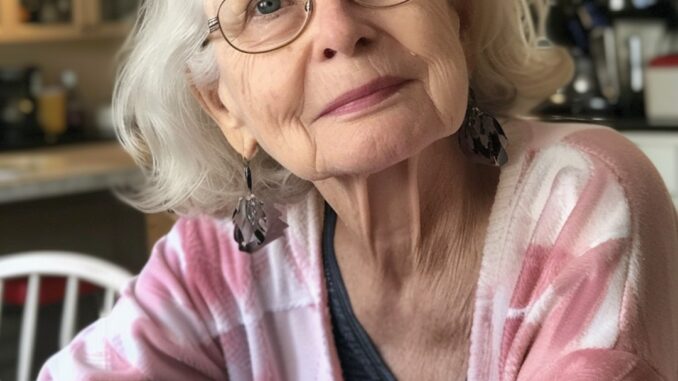
Margaret was 83, fiercely independent, and fed up with her family circling her like vultures. When she vanished without a trace, leaving only a cryptic note, her children were frantic. What they never expected was her bold final move, one that would leave them utterly stunned.
My name is Dorothy, and I’m 80 years old. Margaret was my best friend for decades, and now, her story deserves to be told.
She was the sharpest, sassiest woman I ever knew. She’d call me her “partner in crime,” though most of our escapades involved nothing more scandalous than sneaking extra donuts or gossiping over coffee. Margaret lived modestly but wisely. She had a cozy bungalow, adorned with flower boxes, and a beautiful colonial-style house that her late husband, Tom, had cherished.
When Tom passed 20 years ago, Margaret rented out the colonial home to cover her bills. “Tom would’ve hated it,” she’d say with a wink, “but a lady’s gotta live.” She never relied on anyone—not even her kids, Lisa and David.
“Dorothy,” she’d often say, wagging her finger, “independence is a woman’s best friend. Next to coffee, of course.”
But as Margaret’s health began to decline last year, she finally needed a little help. I started running errands for her, and her children began visiting more often. At first, it seemed like they cared. Then I noticed their true motives: they weren’t helping—they were circling.
Lisa, always dressed as though she were heading to brunch, would eye the colonial house wistfully. “It’s such a shame that big house just sits empty,” she’d say. “A family like mine could really use it.”
David, on the other hand, showed up with his laptop, posing as Margaret’s financial advisor without her asking. “Mom, selling that house could really set you up—or help the family. Just something to think about.”
Margaret hated it. “I’ll decide what to do with my houses when I’m good and ready,” she’d tell them, her tone sharp. “And don’t you dare act like I’m about to kick the bucket.”
The grandkids weren’t any better. Lisa’s eldest, Jessica, would butter Margaret up with baked goods and sweet notes like, “Grandma, wouldn’t it be wonderful if our family got to live in that big house?” David’s son, Kyle, was more direct: “Grandma, you should just give it to Dad.”
One afternoon, after overhearing Lisa and David arguing over the colonial house in Margaret’s living room, she’d had enough.
“You’d think I was already six feet under with the way you’re fighting over my stuff!” she snapped, silencing them both.
“But Mom, we’re just trying to help—” Lisa started, only to be cut off by Margaret’s glare. “If you want to help, wash the dishes. Otherwise, don’t come around here with your nonsense.”
Later, as she sat in her kitchen with me, Margaret shook her head. “They’re shameless, Dorothy. Just shameless.”
I tried to reassure her. “They’ll back off eventually.”
She smirked. “Don’t count on it. But I’ve got a plan.”
When I pressed her, she simply grinned. “You’ll see.”
A week later, Margaret was gone. No warning, no goodbyes—just a single note left on my doorstep:
“Dear Dorothy,
Don’t worry about me. I’m safe and need some time to myself. Keep an eye on the vultures for me. I’ll be back when I’m ready.
Love, Margaret.”
At first, I thought she might be at a local bed-and-breakfast or staying with a friend. But days turned into weeks, and it became clear she’d gone far. Her phone was disconnected, and no one—not even her children—knew where she was.
Lisa and David were frantic. They showed up constantly, demanding answers. “This isn’t like her!” Lisa wailed, while David paced my living room. “She’s punishing us, isn’t she?”
I shrugged, playing dumb. Margaret had entrusted me with her secret, and I wasn’t about to betray her.
Then, one morning, a postcard arrived in my mailbox. The photo on the front was of a stunning mountain range, snowcapped peaks under a brilliant sky. The handwriting on the back was unmistakably Margaret’s:
“Dear Dorothy,
I’m finally breathing fresh air. Wish you were here—but don’t tell the vultures. I’ll write again soon.
Love, Margaret.”
I couldn’t help but smile. Margaret wasn’t just gone—she was free.
When Margaret finally returned months later, she looked like a new woman. Her cheeks were rosy, her step lighter, her eyes sparkling with mischief.
“Don’t just stand there gawking, Dorothy,” she said, breezing through my door with a small suitcase. “Put the kettle on. I’ve got stories to tell.”
She regaled me with tales of gondola rides in Venice, dancing in a village square, and sipping wine in a French vineyard. For the first time in years, she seemed truly alive.
A few days later, Margaret passed away peacefully in her sleep, a serene smile on her face.
At the will reading, Lisa and David were eager, expecting to inherit her properties. But the lawyer had a surprise for them:
“The colonial house and bungalow have both been sold,” he announced.
“What?!” Lisa shrieked, while David fumed. “What about the money?” they demanded.
The lawyer opened a letter from Margaret:
“To my beloved family,
Thank you for reminding me that life is short and happiness is meant to be lived, not hoarded. The houses are gone, but the memories I made are priceless. Dorothy, I’ve left the remainder of my estate to you. Use it to see the world—live boldly, as I did.
Love, Margaret.”
The room erupted into chaos, but I didn’t care. Margaret’s legacy wasn’t the houses or money—it was the reminder to live fully. A month later, I boarded a plane to Paris with Margaret’s photo album tucked in my bag.
As I soared above the clouds, I raised a tiny cup of champagne. “This one’s for you, Margaret.”
Leave a Reply